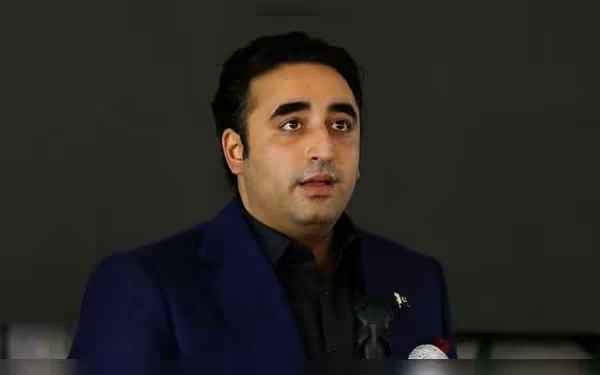Saturday, November 16, 2024 07:52 PM
Bilawal Optimistic About Judicial Package Passage by October 25
- Bilawal predicts constitutional amendment passage by October 25.
- Government lacks necessary votes for judicial reforms.
- Consensus among political parties remains crucial for success.
 Image Credits: thenews
Image Credits: thenewsBilawal Bhutto-Zardari expresses optimism for judicial package passage by October 25 amid ongoing political negotiations.
In recent developments regarding judicial reforms in Pakistan, Pakistan Peoples Party (PPP) Chairman Bilawal Bhutto-Zardari has expressed optimism that a proposed constitutional amendment is likely to pass through parliament by October 25. This prediction comes amid ongoing discussions about the need for consensus among various political stakeholders. Bilawal emphasized that while the government may see this date as a deadline, the PPP does not share the same urgency, stating, "There is no deadline from our side for the constitutional amendment."
Bilawal's comments reflect a cautious approach to the proposed changes, which aim to reform the judiciary. He noted that the government is eager to push the amendment through before the end of the month, but he believes that doing so is "neither a necessity nor obligatory." This sentiment highlights the complexities involved in the legislative process, especially when it comes to significant constitutional changes.
During a recent interaction with journalists, Bilawal reiterated the importance of building a consensus among all political forces, including the Jamiat Ulema-e-Islam Fazl (JUI-F) party, led by Maulana Fazlur Rehman. The JUI-F chief has previously rejected the government's proposal to extend judges' tenure or increase their retirement age, which adds another layer of difficulty to the situation. Last month, the coalition government attempted to pass a closely-guarded judicial package but faced significant opposition, particularly from the JUI-F.
It is crucial to note that the government currently lacks the necessary votes to pass the legislation, being short of 13 votes in the National Assembly and nine in the Senate. This situation underscores the importance of securing a two-thirds majority in both houses for any constitutional amendment. Bilawal mentioned that the government could consider "conscience voting" to reach the required number, but he also stressed that efforts are ongoing to achieve a broader consensus.
On October 4, the Supreme Court made headlines by revisiting its earlier stance on Article 63(A), which addresses defection by lawmakers. This decision, made by a five-member bench led by Chief Justice Qazi Faez Isa, allowed for a review petition filed by the Supreme Court Bar Association. Bilawal responded to questions about judicial reforms, stating, "We want judicial reforms and equal rights of provinces," indicating a desire for a more equitable legal framework across the country.
Furthermore, Bilawal pointed out that while the JUI-F chief has shown some agreement on the need for constitutional courts and judicial reforms, there remains significant opposition to specific proposals, particularly those concerning Articles 8 and 51 of the Constitution. He also criticized the Pakistan Tehreek-e-Insaf (PTI) party, founded by Imran Khan, for its lack of seriousness in political discussions, suggesting that instead of engaging with other politicians, Khan prefers to negotiate with the establishment.
The ongoing discussions surrounding the proposed judicial package highlight the intricate dynamics of Pakistan's political landscape. As various parties navigate their positions and seek consensus, the outcome of these deliberations will significantly impact the future of judicial reforms in the country. The push for constitutional amendments not only reflects the government's agenda but also the broader aspirations for a more just and equitable legal system in Pakistan. As the deadline approaches, all eyes will be on parliament to see if a consensus can be reached, paving the way for meaningful reforms that could benefit the citizens of Pakistan.













